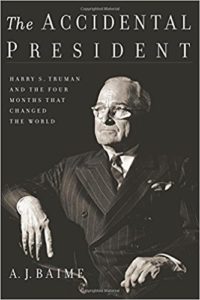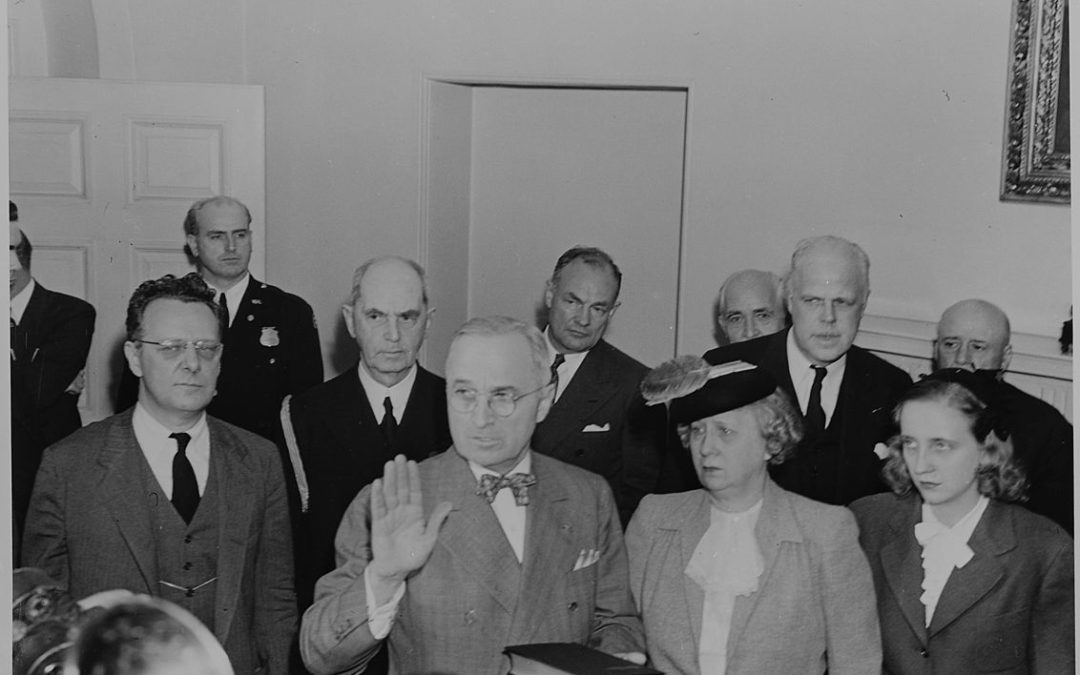The have been few times in history when shape of the geopolitical world changed more dramatically than during four world-shaking months in 1945:
- A fatal stroke ended Franklin Roosevelt’s dozen year presidency.
- The United Nations was founded.
- Nazi Germany fell after Hitler’s suicide.
- Mussolini was executed.
- The Potsdam Conference of the Big Three (United States, Great Britain, Russia) met to shape and reorder national boundaries in the aftermath of World War II.
- Two atomic bombs reined destruction on Hiroshima and Nagasaki.
- Japan surrendered.
The man at the center of these momentous events was small-town failed businessman and farmer who was suddenly catapulted into the Oval Office upon FDR’s death.
Truman Becomes President: Summoned to the White House on April 12, 1945 and informed that he was now president, Harry S Truman asked FDR’s widow, Eleanor, if there was anything he could do for her. She replied by asking “Is there anything we can do for you? For you are the one in trouble now.” He immediately recognized how woefully unprepared he was for the challenges ahead. FDR had failed to brief him or keep him in the loop during Truman’s 83 days as vice president. “I felt like the moon, the stars, and all the planets had fallen on me,” Truman confessed to a group of reporters on his first full day as president. He was an accidental president.
Previous Accidental Presidents: America has had nine accidental presidents who were elevated to the office by the death or resignation of a president. More than half of this select group – most of whose names we barely recognize – faded silently into history as their attempts to claim the White House on their own failed. But four of these accidental presidents went on to win a full term of their own, starting with Theodore Roosevelt in 1904, who famously crowed to his wife on his victorious election night that he was “no longer a political accident.” Twenty years later, Calvin Coolidge, who had inherited the presidency upon Warren Harding’s death, signed his own lease on the White House. In 1948, Harry Truman came back from an almost certain political graveyard to surprise the pollsters and pundits with his victory over Thomas Dewey. And in 1964, the voters overwhelmingly chose Lyndon Johnson to occupy the Oval Office for fou r years after John F. Kennedy’s assassination.
r years after John F. Kennedy’s assassination.
New Book on Truman: An insightful and highly readable new book (four years in the making) will be published on October 24, 2017 titled “The Accidental President: Harry S. Truman and the Four Months That Changed the World,” by award-winning author A.J. Baime. I had the pleasure of reading an advance copy of the book from the publisher, Houghton Mifflin Harcourt, and interviewed Mr. Baime on October 10, 2017.
Truman’s Character: When Harry Truman became president, everything was stacked against him. He was an unknown and untested quantity and faced a world at war. He knew little more about world affairs than most Americans. And yet he competently plunged into the presidency and made quick decisions, despite doubts he (and many Americans) had about his abilities. A.J. Baime told me that Truman relied on principles he learned early in his life: Do the right thing. Honesty is the best policy. Make yourself useful. And undoubtedly, Truman drew strength from the eleven long years that he plowed the 600 acre family farm in Grandview, Missouri. That experience helped build his character – and gave him plenty of time to think and dream of getting away from the monotony of farm work. “I’ve always had a sneakin’ notion that someday maybe I’d amount to something,” the 27 year old farmer wrote after five years of obscurely tending the land. “I doubt it now though like everything.”
History at its Best: Baime is a master story-teller who appears to have invented a time machine. His carefully crafted narrative transports the reader back in time – starting with Truman’s 1884 birth in a small white house in Lamar, Missouri. Each sentence is carefully constructed and colorfully packed with details that makes Harry Truman and this period in history come alive. “The Accidental President” reads more like a captivating novel than non-fiction. The book is good history in that it simplifies events without being simple.
Marks of Good Writing: There are a two marks of good writing, each of which deals with how long a reader takes to absorb a book – but from opposite ends of the spectrum. First, good writing causes the reader to read slowly and linger over words and sentences just to appreciate the sheer beauty of expression. Second, good writing propels the reader to rush through the book because it hard to put it down. “The Accidental President” is good writing at both levels.
5 Sections: In the five sections the book is divided into, the reader is invited to a front row seat to witness not only the monumental events of World War II that dominated Truman’s first four months in office, but to get an inside look into Truman’s mind and character and how this accidental president quickly rose to the occasion to lead the nation and world at a critical moment in history.
- April 12, 1945 – On this momentous day, FDR died in Warm Springs, Georgia and Truman assumed the presidency. This section describes the day with minute-by-minute commentary as events unfolded. I felt as though I was right there with Truman and understood the challenges he faced with his new responsibilities.
- The Political Education of Harry S. Truman – This section offers a condensed mini-biography of Truman from his childhood, military service in Europe in World War I, courting and marriage of Bess Wallace, failed businesses, eleven years of hard work farming, local elections to county administrative posts, election and service in the Senate, through his surprise selection as FDR’s running mate in 1944.
- April – May 1945 – From his first full day in office, Truman made quick decisions – and he read a lot, often late into the night to get up to speed. During his first two months in office, he made staffing decisions, attended FDR’s funeral, addressed a joint session of Congress the day after FDR’s burial, received military briefings, and moved into the White House almost a month after FDR’s death. And, of course, the war and its world-shaking events consumed major portions of his time and energy. He learned for the first time about the top secret atomic bomb that was being developed. In Europe, Hitler committed suicide, the Third Reich collapsed, Germany surrendered, and prison camps were liberated. In the Far East, the costly battle of Okinawa raged, and Japanese cities were fire bombed. For Truman, there were so many major decisions he had to make for which there was no right answers.
- June – July 1945 – These two months were packed with drama for Truman as he learned more about the atomic bomb and decided to use it to force Japan to surrender. He dealt with Russia, an ally during the war, that was backpedaling on its commitments from Yalta and seeking domination over Poland, Hungary, Bulgaria, and in the Far East. He was faced with responding to what was really the beginning of the Cold War, even as the real war was winding down.
- Little Boy, Fat Man, and Potsdam – This section focuses on the Potsdam Conference that Truman attended with Churchill and Stalin to shape the post-war era, along with his decision to drop atomic bombs on Japan (Little Boy on Hiroshima and Fat Man on Nagasaki) in order to force Japan to surrender and bring the war to a speedy conclusion.
Read It: You won’t be disappointed with reading “The Accidental President: Harry S. Truman and the Four Months That Changed the World.” I highly recommend this book! Thanks to A.J. Baime for this outstanding contribution to our understanding of Harry Truman and the first four months of his presidency.


 Facebook
Facebook
 Twitter
Twitter
 LinkedIn
LinkedIn
 YouTube
YouTube
 Pinterest
Pinterest